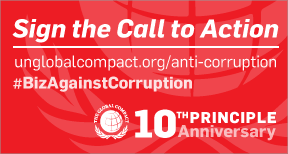The Call to Action is an appeal by the private sector to Governments to promote anti-corruption measures and to implement policies that will establish systems of good governance.The Call to Action urges Governments to underscore anti-corruption and good governance as fundamental pillars of a sustainable and inclusive global economy. View list of signatories.
Why Companies Should Sign the Call to Action
What Happens after a Company Signs the Call to Action
How to Sign the Call to Action
Why business is advocating for Anti-Corruption in the Global Development Agenda
Spread awareness on the importance of the Call to Action!
The Call to Action asks Governments to:
- Fully implement and enforce the tenets of the UN Convention against Corruption by strengthening anti-corruption policies, laws and enforcement mechanisms to create a level playing field and incentivize good behaviour;
- Make a commitment to reducing corruption risks from procurement and contract processes of large-scale projects that are designed to support sustainable development;
- Commit to engaging in competitive and transparent procurement processes through public advertising of all government procurement cases;
- Achieve greater transparency in relation to revenues received by Governments from private sector companies;
- Support corporate efforts to enhance anti-corruption implementation, corporate governance, innovative collective action and public-private partnership initiatives.
The Call to Action is the result of over six months of development and consultation by a taskforce comprising members from the UN Global Compact Anti-Corruption Working Group, the World Bank Institute, the Open Contracting Initiative and Transparency International that explored the private sector’s perspective on anti-corruption and good governance in the global development agenda.
- Frequently Asked Questions
- Call to Action: Anti-Corruption and the Global Development Agenda Signatories
Why Companies Should Sign the Call to Action
Signing the Call to Action offers a unique opportunity for businesses to:
- Demonstrate leadership in advancing good governance and anti-corruption;
- Contribute to reducing the cost of corruption to doing business and to creating a level playing field for all;
- Seek a competitive advantage by attracting responsible investors, shareholders and consumers;
- Shape the anti-corruption policy agenda and influence future laws and regulations
What Happens after a Company Signs the Call to Action
A company signing the Call to Action can also take action to continuously improve and increase its anti-corruption efforts by:
- Integrating anti-corruption efforts into its business and operational strategy, as well as its organizational culture;
- Setting the tone from the top-management of the organization towards zero-tolerance of bribery and corruption;
- Sharing good practices in the fight against corruption;
- Collectively engaging with businesses and other stakeholders through the UN Global Compact and its Local Networks, as well as other relevant initiatives;
- Engaging in policy dialogue to encourage more robust disclosure, transparency and enforcement mechanisms.
Signatories of the Call to Action will be acknowledged at the UN Global Compact’s 10th Principle Anniversary event to be held in New York on 10 December 2014. Your company’s name will also be featured as a signatory on the UN Global Compact’s Call to Action Website. The Call to Action – which is supported by the UN Global Compact, the UN Office on Drugs and Crime, Transparency International, the Open Contracting Initiative, the World Bank Institute and the Global Organization of Parlamentarians against Corruption – will be forwarded to UN Secretary General Ban Ki-Moon to highlight the private sector’s continuing efforts to work with other stakeholders to address corruption.
How to Sign the Call to Action
All companies – from learners to leaders committed to advancing anti-corruption efforts – are invited to sign the Call to Action. A company wishing to become a signatory to the Call to Action should:
- Submit a letter signed by a C-suite level executive or Board Member responsible for corporate governance stating the company’s support to the Call to Action and its commitment to prevent corruption in all its forms, including extortion and bribery. Click here to view a sample statement of support.
- Send the signed letter to anticorruption@unglobalcompact.org
Why business is advocating for Anti-Corruption in the Global Development Agenda
Corruption is the single greatest obstacle to economic and social development around the world. It has adverse impacts on sustainable development, with a disproportional impact on poor communities. Corruption has considerable and costly impacts on the private sector as it raises transaction costs, undermines fair competition, distorts development priorities, and impedes long-term foreign and domestic investment. To prevent future development efforts from being undermined by corruption, it is critical to leverage good governance and anti-corruption into the global development agenda.
For more information on the business case for anti-corruption, please click here.
Spread awareness on the importance of the Call to Action!
Your company’s participation in this Call to Action promotes your continued efforts to integrate anti-corruption into your strategies and operations. Integration of anti-corruption not only brings about change in your organization, but also inspires peers in your industry to do the same.
You can publicly communicate your commitment to the Call to Action by having your company’s name featured on the Global Compact’s Call to Action website. You can also show your support and encourage others to sign the Call to Action by sharing the image below through social media, on your website and in your email signature, or by using the campaign hashtag: #BizAgainstCorruption
Contact
Ms. Olajobi Makinwa
Head, Transparency & Anti-Corruption Initiatives
UN Global Compact
makinwa (at) un.org
+ 1 917 367 2283

